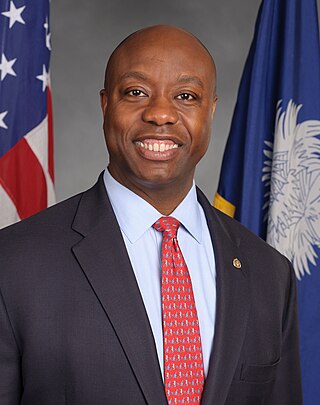Related Research Articles

Greenville County is located in the state of South Carolina, in the United States. As of the 2020 census, the population was 525,534, making it the most populous county in the state. Its county seat is Greenville. The county is also home to the Greenville County School District, the largest school system in South Carolina. County government is headquartered at Greenville County Square.

Charleston County is located in the U.S. state of South Carolina along the Atlantic coast. As of the 2020 census, the population was 408,235, making it the third most populous county in South Carolina. Its county seat is Charleston. It is also the largest county in the state by land area. The county was created in 1800 by an act of the South Carolina State Legislature.

Lexington is the largest town in and the county seat of Lexington County, South Carolina, United States. It is a suburb of the state capital, Columbia. The population was 23,568 at the 2020 Census, and it is the second-largest municipality in the greater Columbia area. The 2022 estimated population is 24,626. According to the Central Midlands Council of Governments, the greater Lexington area had an estimated population of 111,549 in 2020 and is considered the fastest-growing area in the Midlands. Lexington's town limits are bordered to the east by the city of West Columbia.

Henry Dargan McMaster is an American politician and attorney serving as the 117th governor of South Carolina since 2017. A member of the Republican Party, he was the 50th Attorney General of South Carolina from 2003 to 2011 and the 91st lieutenant governor of South Carolina from 2015 to 2017 under then-governor Nikki Haley.

Nimarata Nikki Haley is an American politician who served as the 116th governor of South Carolina from 2011 to 2017. She was the 29th United States ambassador to the United Nations for two years, from January 2017 through December 2018. She is the first Indian American to serve as a member of a presidential cabinet.

Hugh Kenneth Leatherman Sr. was an American politician who served as a Republican member of the South Carolina Senate from 1981 until his death in 2021. The 31st District, which he represented, is anchored in Florence, South Carolina. From 2001 until his death, Leatherman effectively controlled South Carolina's budget as the Senate Finance Chairman and was considered one of the most powerful people in South Carolina politics. He negotiated the deal to bring Boeing to South Carolina in 2009 and secured funding for the deepening of the Charleston Harbor in 2011. At the time of his death, Leatherman served as Vice Chairman of the Senate Transportation Committee. He served as President Pro Tempore of the South Carolina Senate for all but one day from June 18, 2014, to January 8, 2019. The position was abolished and replaced with the President of the Senate. Prior to this change, Leatherman was capable of being both President of the Senate and Senate Finance Chairman. He was also a member of the State Budget and Control Board until it was abolished in 2014.
Electoral reform in the United States refers to efforts to change American elections and the electoral system used in the United States.
Same-sex marriage in South Carolina has been legal since a federal court order took effect on November 20, 2014. Another court ruling on November 18 had ordered the state to recognize same-sex marriages from other jurisdictions. Following the 2014 ruling of the Fourth Circuit Court of Appeals in Bostic v. Schaefer, which found Virginia's ban on same-sex marriage unconstitutional and set precedent on every state in the circuit, one judge accepted marriage license applications from same-sex couples until the South Carolina Supreme Court, in response to a request by the Attorney General, ordered him to stop. A federal district court ruled South Carolina's ban on same-sex marriage unconstitutional on November 12, with implementation of that decision stayed until noon on November 20. The first same-sex wedding ceremony was held on November 19.
Dallas Woodhouse is an American political operative active in North Carolina and South Carolina. In May 2022, Woodhouse was named the executive director of the South Carolina Policy Council, a limited-government think tank based in Columbia South Carolina.

Timothy Eugene Scott is an American businessman and politician serving as the junior United States senator from South Carolina since 2013. A member of the Republican Party, Scott was appointed to the U.S. Senate by Governor Nikki Haley in 2013. He retained his seat after winning a special election in 2014, and was elected to two full terms in 2016 and 2022.

The State Policy Network (SPN) is a nonprofit organization that serves as a network for conservative and libertarian think tanks focusing on state-level policy in the United States. The network serves as a public policy clearinghouse and advises its member think tanks on fundraising, running a nonprofit, and communicating ideas. Founded in 1992, it is headquartered in Arlington, Virginia, with member groups located in all fifty states.

Alan McCrory Wilson is a South Carolina National Guard officer, attorney, and politician serving as the 51st Attorney General of South Carolina since 2011. He is a member of the Republican Party.

South Carolina government and politics covers the three different branches of government, as well as the state constitution, law enforcement agencies, federal representation, state finances, and state taxes. South Carolina is a state in the United States of America and was the eighth admitted to the Union. The state of South Carolina was preceded by the Crown Colony of South Carolina, a constitutional monarchy which was overthrown during the American Revolution. Presently, South Carolina's government is formed as a representative democracy.

The South Carolina superintendent of education is the executive of the South Carolina Department of Education. The superintendent is responsible for overseeing the 1.5 billion dollar budget of the department and ensure that schools and schools districts are abiding by federal and state laws as well as the requirements established by the department. The superintendent is elected at-large and serves a term of four years. The position has no term limits. The current superintendent of education is Ellen Weaver, a Republican, who was elected in 2022 upon the retirement of Molly Spearman.

Lee Bright is an American politician who served as the South Carolina State Senator from the 12th district from 2009 to 2017. A member of the Republican Party, his district included Spartanburg County and Greenville County. Bright unsuccessfully ran for the U.S. Senate in 2014 and U.S. House of Representatives in 2018.

The 2018 South Carolina gubernatorial election was held on November 6, 2018, to elect the Governor of South Carolina. Incumbent Republican Governor Henry McMaster, who took office after Nikki Haley resigned to become U.S. Ambassador to the United Nations, ran for election to a full term. The primary was held on June 12, with the Democrats nominating State Representative James E. Smith Jr. McMaster failed to win a majority of the vote, and then defeated John Warren in the Republican runoff on June 26. In the general election, McMaster defeated Smith, winning election to a full term.

Julie Palakovich Carr is an American politician from Maryland. She is a member of the Democratic Party who currently serves in the Maryland House of Delegates, representing District 17 in Montgomery County. She previously served on the Rockville City Council.

Richard A. Harpootlian is an American attorney and politician serving as a member of the South Carolina Senate from the 20th district. He served as the chair of the South Carolina Democratic Party from 1998 to 2003 and again from 2011 to 2013. He also previously served as Solicitor for the Fifth Judicial Circuit of South Carolina from 1991 until 1995.
The political positions of Nikki Haley have been reported from her career in the South Carolina House of Representatives, during her 2011–2017 governorship, from her books Can't Is Not an Option and With All Due Respect, and during her tenure as United States Ambassador to the United Nations from January 2017 until the very end of 2018. Some of these policy positions have changed, while others remain unchanged.

Ellen Weaver is a Republican politician who has served as South Carolina Superintendent of Education since January 11, 2023. She defeated Democrat Lisa Ellis in the general election in November 2022. She is the president and CEO of the Palmetto Promise Institute, a conservative think tank in South Carolina.
References
- 1 2 "About Us". South Carolina Policy Council. Retrieved 16 March 2015.
- ↑ "South Carolina Policy Council Education Foundation" (PDF). Foundation Center. Retrieved 27 February 2019.
- 1 2 Hutchins, Corey (May 16, 2014). "His boss helped start SC's biggest political scandal. Now, this reporter is covering it". Columbia Journalism Review. Retrieved 16 March 2015.
- ↑ "A new kind of 'think tank'". South Carolina Policy Council. Retrieved 4 March 2019.
- ↑ Brundrett, Rick (November 10, 2014). "Do-nothing ethics committees". The Times and Democrat. Retrieved 16 March 2015.
- ↑ SCPC staff (April 28, 2022). "SCPC announces Dallas Woodhouse as Executive Director". The South Carolina Policy Council.
- ↑ SCPC staff (May 20, 2022). "Inflation in SC shows need for bold tax cuts". The South Carolina Policy Council.
- ↑ SCPC staff (July 27, 2022). "Transparency check-in: streaming at the Statehouse". The South Carolina Policy Council.
- 1 2 "Voters back school choice bill. Can lawmakers get it across the finish line?". The Nerve. June 23, 2022.
- ↑ SCPC staff (June 9, 2022). "SCPC Voter Poll Release (May 31 - Jun 3, 2022)". The South Carolina Policy Council.
- ↑ "Who Controls S.C. State Government?". SC Policy Council. Retrieved 7 April 2015.
- ↑ Jackson, David (April 30, 2014). "South Carolina Republicans battle over ethics case". USA Today. Retrieved 16 March 2015.
- ↑ Santaella, Tony (October 23, 2014). "S.C. House speaker admits misconduct, resigns". USA Today. Retrieved 16 March 2015.
- ↑ Self, Jamie. "Gov. Haley blasts SC House for off-the-record voting" . Retrieved 7 April 2015.
- ↑ "Who Runs South Carolina State Government?". The South Carolina Policy Council. 2014-10-30. Retrieved 2017-04-04.
- ↑ "Report: What to Do about South Carolina's Roads". The South Carolina Policy Council. 2016-01-29. Retrieved 2017-04-04.
- ↑ "Project Conflict Watch". The South Carolina Policy Council. Retrieved 2017-04-04.
- ↑ "Income Disclosure Bill Becomes Law". The South Carolina Policy Council. 2016-06-23. Retrieved 2017-04-04.